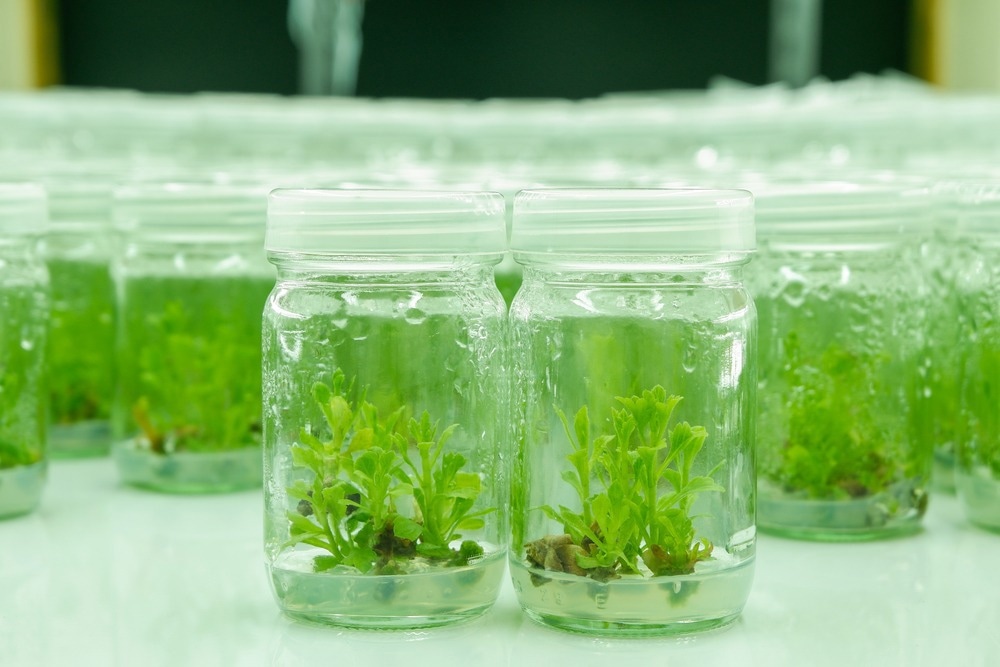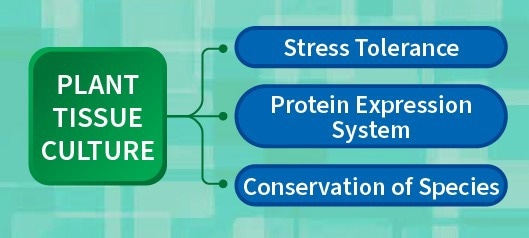Plant tissue culture (PTC) has been utilized for over a century, originating with Haberlandt's invention in 1902. The Murashige and Skoog medium (MS medium) introduction in 1962 established a foundation for most PTC protocols. The significance of PTC surged in the late 1990s as commercial entities aimed to create methods for introducing desirable traits into economically viable crops.

Image Credit: suradach kulduang/Shutterstock.com
PTC techniques include transforming various explants from the mother plant, regenerating them in optimal conditions, and micropropagating valuable species. The original MS medium formula and its derivatives are still widely employed by businesses globally.
Currently, the most critical potential of plant tissue culture is emerging in response to climate change and the increasing demands of the human population. These techniques can support sustainable practices by multiplying endangered species, reforesting eroded lands, creating heavy metal-absorbing plants, and producing virus-free plant varieties.1
Salt-tolerant plant cell line
Climate change significantly stresses plant life, making the development of stress-resistant plants essential. In vitro multiplication for stress tolerance has gained popularity in producing secondary metabolites and developing resistant cell lines.
High salinity is a critical problem in agriculture due to climate change, affecting millions of hectares worldwide. Excessive salt disrupts physiological processes, leading to mineral deficiencies, osmotic stress, and oxidative damage.
A tissue culture approach has proven effective in elucidating cellular mechanisms for salt tolerance responses.2-4 Hannachi et al. (2021) demonstrated the development of salt-tolerant eggplant variants through somaclonal variation using in vitro callus culturing.5
Silicon supplementation offers several valuable benefits for plants, particularly in managing environmental stress. It helps limit sodium chloride (NaCl) uptake, supports the ultrastructure of stomata, enhances photosynthetic activity, reduces free proline levels, and influences the activity of antioxidant enzymes. These effects improve stress tolerance under conditions such as salinity, drought, heavy metal exposure (e.g., aluminum), and temperatures.6
To aid research and application in this area, HiMedia provides a comprehensive selection of products. This includes plant tissue culture media like MS Medium and specialized callus regeneration media for crops such as tobacco and date palm. The range also features growth regulators like thidiazuron (TDZ) for callus induction and propagation, along with PTC-tested compounds such as sodium metasilicate (Na2SiO3) and calcium silicate (Ca2SiO4) that support silicon-related studies.

Various relevant applications of Plant Tissue Culture (PTC). Image Credit: Himedia Laboratories Private Limited
Recombinant protein production
In recent years, outbreaks of infectious diseases have highlighted the need for rapid production of innovative treatments. In such scenarios, transient expression techniques are preferable over stable transgenic methods, which are time-consuming.
PTC offers benefits for recombinant protein creation, including post-translational modifications and reduced contamination risks. Studies have demonstrated the effectiveness of Nicotiana tabacum and N. benthamiana cell cultures in expressing recombinant proteins. For instance, N. benthamiana has been explored as a model for protein expression and has been utilized in developing COVID-19 vaccines like COVIFENZ® (Medicago Inc).
Tobacco has also shown promise as a platform for producing eukaryotic cell-free protein expression systems, such as ALiCE®—developed by AMSBIO—using plant cell lysates.
Recognizing the importance of this research, HiMedia offers a range of products to support such studies. These include MS basal solution, MS plant salt mixture, tobacco callus initiation medium, and essential supplements like myo-inositol, niacin, and thiamine hydrochloride, among others.
Protocol optimization for conserving medicinally important endangered plant species
The Orchidaceae family represents a significant portion of India’s plant kingdom, with nearly 1,350 species across 185 genera. Known for its extensive use in traditional herbal medicine, this family contains notable biochemical compounds such as dendrobine, moscatilin, gigantol, and denbinobine—all recognized for their anti-cancer properties.
Despite thriving in India’s favorable agroclimatic conditions, many of these species are now critically endangered due to overharvesting, deforestation, and habitat loss. In response, several studies have focused on population restoration.
In 2016, a group of Indian researchers developed a micropropagation protocol for Dendrobium nobile, a medicinally important species from the Orchidaceae family, aimed at both ex situ conservation and commercial application. This standardized methodology was refined through a series of trials and involved the use of various growth regulators such as meta-topolin and α-naphthaleneacetic acid (NAA), along with polyamines and phenolic compounds like spermine, spermidine, putrescine, phloroglucinol, and salicylic acid.8
HiMedia supports this research by offering all of these compounds, along with a broad selection of plant tissue culture (PTC) media specifically formulated for orchid micropropagation.
Plant tissue culture continues to play a pivotal role in agriculture and industry by boosting plant production to meet global demands. In today’s biotechnological landscape, it holds potential to address global challenges like famine, disease, and species loss—contributing to a more sustainable future.
HiMedia’s specialized integration of PTC, branded as Plantigen™, has positioned the company as India’s leading supplier of PTC media and chemicals, offering over 700 plant tissue culture products to customers in more than 150 countries.
References
- Sehgal, D. and Khan, T. (2020). Plant Tissue Culture: Beyond Being a Tool for Genetic Engineering. Springer eBooks, pp.175–200. https://doi.org/10.1007/978-981-15-6021-7_9.
- Parida, A.K. and Das, A.B. (2005). Salt tolerance and salinity effects on plants: a review. Ecotoxicology and Environmental Safety, (online) 60(3), pp.324–349. https://doi.org/10.1016/j.ecoenv.2004.06.010.
- Volkov, V. and Beilby, M.J. (2017). Editorial: Salinity Tolerance in Plants: Mechanisms and Regulation of Ion Transport. Frontiers in Plant Science, 8. https://doi.org/10.3389/fpls.2017.01795.
- Gupta, B. and Huang, B. (2014). Mechanism of Salinity Tolerance in Plants: Physiological, Biochemical, and Molecular Characterization. International Journal of Genomics, (online) 2014(701596), pp.1–18. https://doi.org/10.1155/2014/701596.
- Hannachi, S., et al. (2021). Obtaining Salt Stress-Tolerant Eggplant Somaclonal Variants from In Vitro Selection. Plants, 10(11), p.2539. https://doi.org/10.3390/plants10112539.
- Sivanesan, I. and Park, S.W. (2014). The role of silicon in plant tissue culture. Frontiers in Plant Science, 5. https://doi.org/10.3389/fpls.2014.00571.
- Sukenik, S., et al. (2018). Transient Recombinant Protein Production in Glycoengineered Nicotiana benthamiana Cell Suspension Culture. International Journal of Molecular Sciences, 19(4), p.1205. https://doi.org/10.3390/ijms19041205.
- Bhattacharyya, P., Kumaria, S. and Tandon, P. (2016). High frequency regeneration protocol for Dendrobium nobile : A model tissue culture approach for propagation of medicinally important orchid species. South African Journal of Botany, 104, pp.232–243. https://doi.org/10.1016/j.sajb.2015.11.013.
About Himedia Laboratories Private Limited
With a presence in more than 150 countries, HiMedia is amongst the top three brands in the Bioscience Industry.
HiMedia Laboratories Private Limited is world renowned for manufacturing high quality culture media for microbiology. Additionally, we provide advanced media and products in the fields of Molecular Biology, Cell Biology, Plant Tissue Culture, Chemicals and Lab Aids/Equipment. As a Top Tier Global player, we are not only dedicated towards products but also striven towards introducing technologies such as Genomics Sequencing Services and Hydroponics.
HiMedia has managed to do this over decades as we have our own in-house bulk raw materials manufacturing plant. This enables us to deliver consistent quality products that conform to ISO 9001:2015 and ISO 13485:2012 and WHO: GMP.
HiMedia Labs. caters to one of the broadest Biosciences product categories: our premier established line of Microbiology products and newer promising products in Molecular Biology, Automated and Molecular Instruments, Cell Biology, Chemicals, and Premium Grade Lab Consumables, amongst others. The COVID-19 pandemic revolutionized not the clinical industry’s thought process regarding the significance of Molecular Diagnostics products.
The ‘Molecular Biology and Virology Division’ of HiMedia Laboratories Pvt. Ltd. Also called as HiGenoMB® is a One Stop Solution Provider churning out potential Research and Industry oriented Molecular biology products for the past glorious decade. About 2000 different products such as Nucleic Acid Extraction and Amplification (PCR) Kits, Cloning Reagents, Buffers & Chemicals for proteomics studies, Automated Molecular Instrumentation including RT PCR machines and PCR thermal cyclers and DNA/RNA Extraction platforms are being produced. The Proficient researchers in this department are spear heading the challenging field of Molecular Diagnostics to provide a complete solution for clinical diagnosis, agriculture, veterinary sciences, food industry, drug discovery and forensic medicine with the use of Real Time PCR or quantitative PCR kits and thermal cyclers. Our Molecular Biology Division-has established an in-house Advanced Sequencing and Bioinformatics facility which marks HiMedia’s entry into the Services space.
Our Cell Biology segment contributes with technologies which have brought in Serum free media for biopharma applications, Viral Vaccine Production Platform, Multicompendial grade chemicals, cultivated meat, and 3D bioprinting.
Moving from conventional to advanced automated methods like MALDI-TOF (Autof MS 1000) has been our newest endeavour for Microbiology.
Sponsored Content Policy: News-Medical.net publishes articles and related content that may be derived from sources where we have existing commercial relationships, provided such content adds value to the core editorial ethos of News-Medical.Net which is to educate and inform site visitors interested in medical research, science, medical devices and treatments.